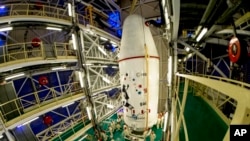LONDON —
Global spending on government space programs dropped for the first time in almost two decades in 2013, a report showed on Thursday, as rising investment among emerging nations failed to offset cuts by the United States.
An annual report by consultancy Euroconsult showed global budgets for space programs dropped to $72.1 billion from $72.9 billion in 2012, the first drop since 1995.
The United States invested $38.7 billion in civil- and defense-related space projects, $8.8 billion down from its 2009 peak but still more than half of the global total.
Russia, by contrast, has ramped up its spending by an average of more than 30 percent over the last five years and is now the only country after the United States to spend more than $10 billion a year.
Japan, China, France, Germany, Italy and India all invested more than $1 billion a year, it said. China, currently in eighth place globally, is expected to ramp up spending considerably over the next decade.
“The current global context for public space programs shows many positive signs brought by new leading space nations and an ever-growing number of countries who have initiated plans to build up their space-based capabilities,” said Steve Bochinger, chief operating officer at Euroconsult.
“We anticipate government space spending to recover in the second part of the decade in many countries currently experiencing intense budget pressure,” he said.
The need to cut spending could itself help fuel innovative technologies that would push space exploration and other projects forward, Euroconsult said.
Some experts say the U.S. space shuttle program in particular wasted millions if not billions that could have been more usefully spent on other projects.
The U.S. space shuttle flew its last flight in 2011. Since then, American astronauts have flown to and from the International Space Station on Russian rockets.
China sent three of its own astronauts into space last year to dock with an orbital laboratory in what Beijing said was a step towards its own manned space station.
The report showed the number of countries taking a serious interest in space exploration is rising.
Fifty-eight countries invested $10 million or more in space applications and technologies in 2013 compared to 53 in 2011 and 37 in 2003. Another 22 countries had plans for space investment, it said.
Britain, Canada, Brazil, Spain, South Korea, Belgium, Kazakhstan, the United Arab Emirates, Argentina, Mexico, Australia, Holland, Switzerland, Turkey, Sweden, Israel, Nigeria, Iran and Norway each spent more than $100 million.
An annual report by consultancy Euroconsult showed global budgets for space programs dropped to $72.1 billion from $72.9 billion in 2012, the first drop since 1995.
The United States invested $38.7 billion in civil- and defense-related space projects, $8.8 billion down from its 2009 peak but still more than half of the global total.
Russia, by contrast, has ramped up its spending by an average of more than 30 percent over the last five years and is now the only country after the United States to spend more than $10 billion a year.
Japan, China, France, Germany, Italy and India all invested more than $1 billion a year, it said. China, currently in eighth place globally, is expected to ramp up spending considerably over the next decade.
“The current global context for public space programs shows many positive signs brought by new leading space nations and an ever-growing number of countries who have initiated plans to build up their space-based capabilities,” said Steve Bochinger, chief operating officer at Euroconsult.
“We anticipate government space spending to recover in the second part of the decade in many countries currently experiencing intense budget pressure,” he said.
The need to cut spending could itself help fuel innovative technologies that would push space exploration and other projects forward, Euroconsult said.
Some experts say the U.S. space shuttle program in particular wasted millions if not billions that could have been more usefully spent on other projects.
The U.S. space shuttle flew its last flight in 2011. Since then, American astronauts have flown to and from the International Space Station on Russian rockets.
China sent three of its own astronauts into space last year to dock with an orbital laboratory in what Beijing said was a step towards its own manned space station.
The report showed the number of countries taking a serious interest in space exploration is rising.
Fifty-eight countries invested $10 million or more in space applications and technologies in 2013 compared to 53 in 2011 and 37 in 2003. Another 22 countries had plans for space investment, it said.
Britain, Canada, Brazil, Spain, South Korea, Belgium, Kazakhstan, the United Arab Emirates, Argentina, Mexico, Australia, Holland, Switzerland, Turkey, Sweden, Israel, Nigeria, Iran and Norway each spent more than $100 million.





